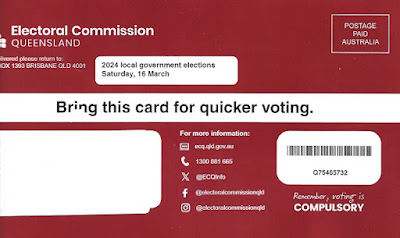 |
| At the cenotaph 25.04.24 |
It took me fifteen years after returning from Vietnam before I marched on Anzac Day.
There were all manner of reasons for this, but foremost amongst them was the reception we received in the early seventies if identified as Vietnam veterans. I was never personally called a "baby killer" but the atmosphere of indifferent hostility (particularly on the campus of the University of Queensland where I was undertaking a Department of Labour and National Service rehabilitation scholarship) was absolutely clear.
So I put the whole experience on a shelf, worked and studied, got married and became a father.
In 1983 I was the principal of a special school in a Northern Brisbane suburb. On Anzac Day of that year the local RSL club donated $500 to the school.
I had previously nothing to do with the RSL, but had to meet with the local president to organise a presentation on Anzac Day, and he became aware that I was a returned soldier. I refused his offer to join the RSL, but accepted an invitation to march.
It was only after the Welcome Home in 1987, that I felt free to march again. Whilst interviewing many who had served in Vietnam for my thesis, I discovered that this behaviour was typical.
For about a decade and a half (from 1972 until 1987) we were personae non-grata. Then came the Welcome Home march, the song, and a change in the public perception. Unfortunately it was too late for some.
So now I march.
This year I went to Sydney and marched there with two blokes I've known since June 1969, when we were marched into 5 Platoon, B Coy, 7 RAR. We went through six months of intensive training which culminated with a couple of weeks at the Jungle Training Centre at Canungra and a pre-embarkation exercise at Shoalwater Bay near Rockhampton.
Together we embarked for Vietnam on HMAS Sydney on 16th February 1970.
We served together through operations Finschhafen and Cung Chung, and all three of us were involved in an assault on a bunker system on 22nd April. B Coy took one KIA* and two WIA+ in that incident, and a soldier from 4 Platoon died of dehydration the day prior to the bunker contact.
You can read about it here.
Then, coincidentally we were all re-posted out of 5 platoon in June 1970, more or less simultaneously and for a variety of reasons driven fundamentally by manpower requirements, which ranks in Vietnam. tended to decide the fate of most Nashos, another fact I discovered during my research.
We're all in our mid-seventies, so marching may not be possible for much longer, so I took the opportunity to travel to Sydney to march with them, probably for the last time.
There were only about thirty of us left to march from a unit that had seen thousands pass through its ranks between 1965 and 1972.
Perhaps, if there are no more wars, nobody will be left to march in the future.
I live in hope.
*Killed in Action
+Wounded in Action







